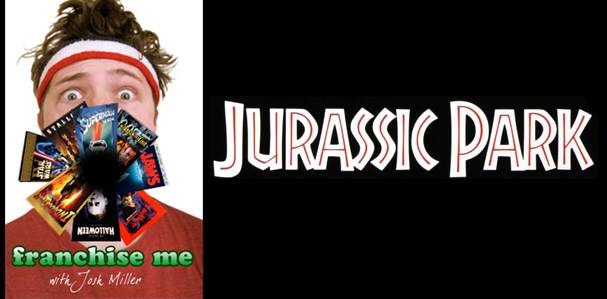
Hollywood loves a good franchise. The movie-going public does too. Horror, action, comedy, sci-fi, western, no genre is safe. And any film, no matter how seemingly stand-alone, conclusive, or inappropriate to sequel, could generate an expansive franchise. They are legion. We are surrounded. But a champion has risen from the rabble to defend us. Me. I have donned my sweats and taken up cinema’s gauntlet. Don’t try this at home. I am a professional.
Let’s be buddies on the Facebookz!
The Franchise: Jurassic Park — concerning the fallout of billionaire John Hammond’s attempts to build a theme park featuring real-life dinosaurs on a tropical island off the coast of Costa Rica. Based on Michael Crichton’s 1990 novel of the same name, the film spawned two sequels.
The Installment: Jurassic Park (1993)
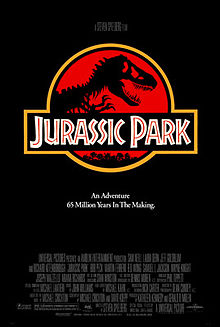
The Story:
Isla Nublar is an island off the coast of Costa Rica. It has got dinosaurs on it. These dinosaurs were put their by affable billionaire John Hammond (that’s sir Richard Attenborough to you, punk), who spent gazillions of dollars perfecting a system in which dino DNA can be extracted from prehistoric mosquitoes that became trapped in petrified amber. On Isla Nublar he has built Jurassic Park, a theme park zoo at which he dreams people from all across the globe will come to see his resurrected dinosaurs. But his investors become concerned when one of Jurassic Park’s workers is all sortsa eaten by Velociraptors. So, to appease these nervous Nancies, and their representative, lawyer Donald Gennaro (Martin Ferrero), Hammond agrees to let three experts sign off on the park — “chao-tician” Dr. Ian Malcolm (Jeff Goldblum), paleontologist Dr. Alan Grant (Sam Neill) and Grant’s ladyfriend, paleobotanist Dr. Ellie Sattler (Laura Dern). So convinced of Jurassic Park’s safety is Hammond that he also brings along his grandchildren, Tim (Joseph Mazzello) and Lex (Ariana Richards). In Hammond’s defense, things would have gone just fine if he hadn’t hired the greedy and rotund Dennis Nedry (Wayne Knight) to do all his computer programming, because Nedry sabotages the park’s security system in order to smuggle out some dinosaur embryos to one of Hammond’s competitors. When Nedry shuts the park’s system down, shit get shitty.
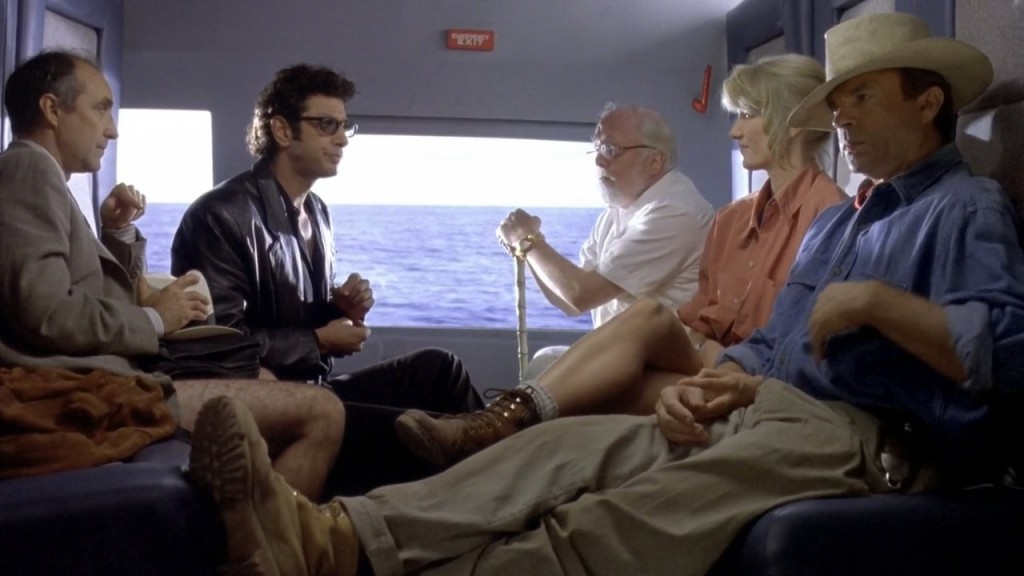
What Works:
Jurassic Park is not Steven Spielberg’s last good movie, or even his last ground-breaking movie, but I’d argue that it is the last great “Spielberg movie,” or at least what that name meant for the first twenty years of his career — kids growing up today, who likely are most familiar with Spielberg’s name from seeing it slapped onto the advertising of mediocre-to-shitty TV shows every year, probably don’t get why their dads have so much love for the man. Not that my own personal experiences with the film matter, but Jurassic Park was the first film adapted from a book that I saw after having read the source material, and it was also the last tent-pole movie I saw while I was still young enough to be truly blown away by a movie — not just impressed with its artistry or storytelling prowess, but left with the feeling that I’d witnessed something important beyond the objective triviality of an excellently made piece of artistic entertainment.
I at least was not alone in that second part. Every aspect of this movie “works,” but as far as film history is concerned, Jurassic Park‘s lasting achievement is of course being the first movie to fully show what computers could do for movie special FX. James Cameron had set the stage with The Abyss and Terminator 2, but JP exploded the whole idea of CG past what anyone had been thinking was possible yet. Future audiences can’t be expected to know or care about that, but it is a testament to the astounding leap forward in quality that the film’s computer generated dinosaurs still look great all these years later. For those familiar with the behind-the-scenes details of JP, you know that this was something of a happy accident, as the film went into production without CG being a part of the mix. Most of the film’s heavy-lifting (quite literally) was done by the late-great Stan Winston, whose animatronic dinosaurs are astounding achievements even unrelated to their use in the film. Not having seen the film in a while I had forgotten just how much of the dinosaur action is done with on-set practical FX (overseen by Michael Lantieri). The teams of Phil Tippett and Dennis Muren’s collective CG work is really just icing, to add plausibility throughout a scene by allowing views of the dinosaurs moving freely in wide shots. This savvy usage helps mask the moments that have inevitably aged in the FX, composites where the CG dinosaurs’ colors look a little washed out, etc. Dinosaurs had been appearing in movies since the silent era, yet Jurassic Park‘s ulra-realistic approach to the dinosaurs’ look and movement erased all memories of these earlier creations. Like the great moment in the film when Dr. Grant gets his first glimpse of a dinosaur upon arriving at the park, seeing this movie in 1993, it was as though this was the first time anyone had even seen a dinosaur on the big screen (sorry, Baby: Secret of the Lost Legend).
Spielberg is firing on all cylinders here. From a storytelling perspective the film is just a beautiful, effortless execution. Spielberg makes making a great movie look shockingly easy. Almost every other scene in this film is an amazing set-piece, and almost every other set-piece became an iconic movie moment. Yet the film also never feels like it is sacrificing story or ignoring its characters in the process. The sense of awe and excitement that builds and builds over the first twenty minutes of the film, as we’re getting closer to seeing some dinosaurs, is electric. And, as was still Spielberg’s style at the time, the movie lacks any sense of slickness. In fact, watching the movie again for the first time in many, many years, I was struck by what a “b-movie” Jurassic Park is. Intentionally so. Spielberg saw Crichton’s idea for what it really is, or at least what it needed to be as a movie. Jurassic Park the novel is serious business. John Hammond is an asshole who deservedly gets killed at the end. Dr. Malcolm dies too. The book climaxes with the Air Force bombing the ever-loving shit out of the island, and the survivors are imprisoned indefinitely at a Guantanamo-like facility to prevent the truth from getting out. Spielberg knew that the appeal of the film is seeing the dinosaurs. He could identify with Hammond; he too was making a theme park ride here, and rides are supposed to be fun. You get scared during the middle of a roller coaster, but when it coasts to a stop at the end you feel good. He saw the story as an adventure, not a thinky high-concept thriller.
And Spielberg seems to be having a blast making this secret b-movie. The entire opening sequence – in which an unlucky park employee gets chewed up during a mishap with the raptors – is great cheeseball fun. Every shot is amped up for excitement, like a comic book, which gives the scene a less horror movie tone than the nature of the scene would seem to dictate. Frankly, the scene is absolutely ridiculous, and might otherwise indicate that we’re in store for a pretty dumbass movie. But this is Spielberg in the prime of his powers, and this exact tone is his bitch — his mojo is in full force. I love the way Spielberg punctuates this scene (and others) with extreme close ups of characters’ mouths. Stylistically it is a weird thing to see in a movie as big as Jurassic Park, but Spielberg is treating the film like he treated Raiders. In his mind he’s making a goofy old adventure flick he might have caught on daytime TV as a kid, full of big monsters and over-the-top danger, but filtered through the filmmaking prowess of a brilliant director. David Koepp was the appropriate guy to re-write Crichton’s script too. Koepp has always been one of Hollywood’s most talented hacks, which I don’t mean to sound as insulting as it obviously does. He has a great mind for putting hacky ideas into a context that doesn’t seem idiotic or overly obvious or even hacky, which is totally in-line for the film that Spielberg is making. Dr. Grant’s first scene, in which he terrorizes a snotty kid who isn’t respectful enough of the Velociraptors’ badassness, is almost eye-rollingly hacky. Almost. But it works. As Speilberg did with Peter Benchley’s Jaws, he and Keopp are able to find the family-friendly fun buried in an otherwise somberly adult book.
The number of iconic moments and indelible images in Jurassic Park are too numerous to name without this just getting boring. It is like talking about Star Wars or The Matrix. Can you imagine a world without parodies and homages of the drinking glass ground-tremors bit? Without the T-Rex iris dilation looking through the window? Rewatching the first T-Rex set piece now is almost boring because almost every single second of it so immediately transferred into our visual lexicon. And like I said, Spielberg makes it look easy. There is something almost juvenile about his approach at times, a sense that he is going for these eye-popping comic book single images for their own sake, yet it all fits together perfectly. And they stay with you. Dr. Grant resting his head on a sick Triceratops’ breathing belly. A raptor eerily illuminated by the numbered code being reflected off a computer screen. A raptor steaming up the small window in a door with its nostrils. A dollying, racking focus in on a mosquito trapped in amber. The T-Rex bellowing in the lobby of the museum as a banner reading “When Dinosaurs Ruled the Earth” falls in front of it. The parallel action of Dr. Grant and the kids climbing over an electrical fence while Ellie is rushing to turn the power back on elsewhere. Everything in the raptor kitchen scene. John Williams’ score and “Jurassic Park theme.” On and on.
Jeff Goldblum’s impression of Jeff Goldblum as Dr. Malcolm is something of an acquired taste, but it is hard to deny that Goldblum constructs a novel and memorable character with the rockstar-like mathematician. Most of the cast is great, but the real stand out performance is Wayne Knight’s wildly despicable Denis Nedry. During a brief few years in the mid-90’s, Wayne Knight was a pop culture comet. Part of this was his reoccurring roll as Jerry Seinfeld’s sometimes nemesis Newman on Seinfeld, the other part was Denis Nedry. Nedry’s first scene, in which he meets the moneyman for his betrayal of Jurassic Park at an outdoor cafe, is gold. Like everything in the film, Nedry is almost beyond over-the-top. At this stage in his life, Knight looked like a cartoon character, impossibly round and weasel-faced. I absolutely love his high-pitched squeals of delight as he is shown the James Bondian can of shaving cream that doubles as a mini-freezer for his stolen dinosaur embryos. He is perfectly hateable. Which makes his final scene – a bad encounter with a crafty frill-necked, vemon-spitting dino while trying to get his truck out of the mud – rival Paul Reiser’s death in Aliens for enjoyably karmic demises. Also, Martin Ferrero, as the cowardly lawyer, Gennaro, gives the film’s most unsung performance. He’s actually rather hilarious, and given most of the film’s subtler dialogue bits.
Jurassic Park is a propaganda film. Propaganda for the Velociraptor, which, from my understanding, is not as big or badass as it is portrayed here. Aside from the whole “don’t play God” theme, the point of the film seems to be convincing us that while the T-Rex may be big and scary looking, the most dangerous dinosaur was in fact the raptor. Spielberg and company put a lot of work into making this known, from the opening scene, to Grant terrorizing that brat with a fossilized raptor claw, to the raptors being fed an entire bull (while T-Rex was fed a puny goat), to pretty much every single goddamn thing the park’s game warden Robert Muldoon (Bob Peck) says in the film. Battling the T-Rex is an early obstacle, after which the T-Rex becomes something of a passive, even friendly (in a Godzilla way) presence; hell, he only eats one person and he’s a slimey lawyer! It is the Velociraptors who get the coveted main-boss position in the climax, and the T-Rex winds up saving our heroes. Before Jurassic Park no one except for scientists and the most dino-obsessed children had even heard of a Velociraptor. After Jurassic Park the creepy buggers instantly reached the same level of fearsome respect that the T-Rex had had for decades. So hot shit were they after the film that when Toronto got an expansion NBA team, the (presumably) twelve-year-old boys running the basketball franchise actually named the team the Raptors. Their mascot is a fucking Velociraptor dribbling a basketball! I guess if you really care about regular people having an accurate knowledge of dinosaurs, then Jurassic Park shit the bed on this one — you’re priorities are also way out of whack. Regardless, most people can only accurately name like four or five dinosaurs, so instantly making any species of dinosaur that famous is an impressive feat for one movie to do. So hat’s off.
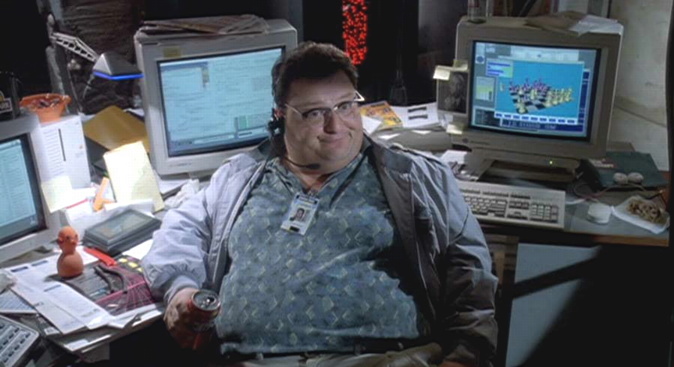
What Doesn’t Work:
Spielberg’s family monster adventure meets somewhat clumsily with Crichton’s Modern Prometheus mumbo-jumbo. While you can certainly forward an argument against cloning, the movie’s whole “God/Darwin killed the dinosaurs for a reason” thematic thread is where Jurassic Park feels the most hacky. And it can becomes a little tiresome. Most of what Dr. Malcolm says in the film on the subject is inanely surface level and at times just stupid, unless you have some religious feelings on the subject (though if you’re that religious, you probably believe Satan put dinosaur bones in the ground to trick us). He says that Hammond and his team didn’t “earn” their knowledge, that they piggybacked on the research of other people. Isn’t that what all scientists do? The point of this line is to create the sense that Hammond is reckless, which, in a sense he is. But the movie also has to go well out of its way (as movies usually do) to get the events of the film to actually happen. In actuality there are a perfect storm of bad coincidences that have to occur to put our characters in serious peril, all of which wouldn’t have been a problem if it weren’t for Denis Nedry. Hammond’s biggest mistake wasn’t cloning dinosaurs. It was hiring Nedry. Though it was a good move overall, this aspect of the movie would have worked better if Hammond had been left as an unlikable character we weren’t supposed to sympathize with.
The only line of dialogue in this thematic vein that actually makes sense is when Ellie chastises Hammond for putting poisonous plants in the park because they look cool (though, really, I find it hard to believe that no one working for Hammond would have know this; he seems like a guy who spares no expense to hire the best). While all this works dramatically in the b-movie tone Spielberg is setting forth, after a while it starts to feel silly how dangerous everyone is acting like these dinosaurs are, that just having them here, existing in the 20th-century, could somehow undue our world — as though these weren’t animals at all, but evil aliens that a past civilization battled to rid the world of, and that now careless scientists are bringing back. Yeah, a dinosaur is scary, but so are lots of animals. Killer whales kill employees at Sea World at least once a decade. Chimps maul trainers. So do tigers. Dr. Grant tells us, “T-Rex doesn’t want to be fed. He wants to hunt. You can’t supress 65 million years of gut extinct.” Well, don’t tell that to crocodiles, whose species has existed (continuously) almost all the way back to when T-Rex lived, and they’re perfectly content to let us toss a hunk of goat into their lazy faces. Dinosaurs are just animals. Big ones. But animals all the same.
All this silliness causes the emotional quality of the film’s ending to be a little strange (for me, now an adult, at least). Hammond has learned the error of his ways. Oops. Bringing back dinosaurs. Terrible idea. No more Jurassic Park. To which almost every single person on the planet would say, “Um, fuck you? I want to see a motherfucking dinosaur. At least in a documentary or something.” The no-gray-area, definitive moralistic reasoning of our characters seems unnecessary. And inconsistent, actually…
Our heroes’ attitudes wouldn’t become as tiresome if everyone was at least consistent in their attitudes. But really their attitudes just conveniently shift depending on what the scene requires. Everyone seems scared shitless about the dinosaurs, yet Dr. Grant doesn’t even think twice about jumping out of the vehicle to go prance through a field and look at a Triceratops — which, if they were anything like rhinos, would totally kill you just as eagerly as a raptor (just for different reasons). Everyone is functioning on movie logic. The scene where Dr. Grant and Tim are hurrying down a tree while their Ford Explorer is rapidly cracking through branches towards them is great and exciting — and also doesn’t make much sense if you stop and think about it even for a second. Why not crawl around to another side of this giant tree? Why keep advancing directly below the vehicle? Cause it’s exciting. That’s the answer.
Of course, this is all an academic extended nitpick. Because Jurassic Park most definitely works.
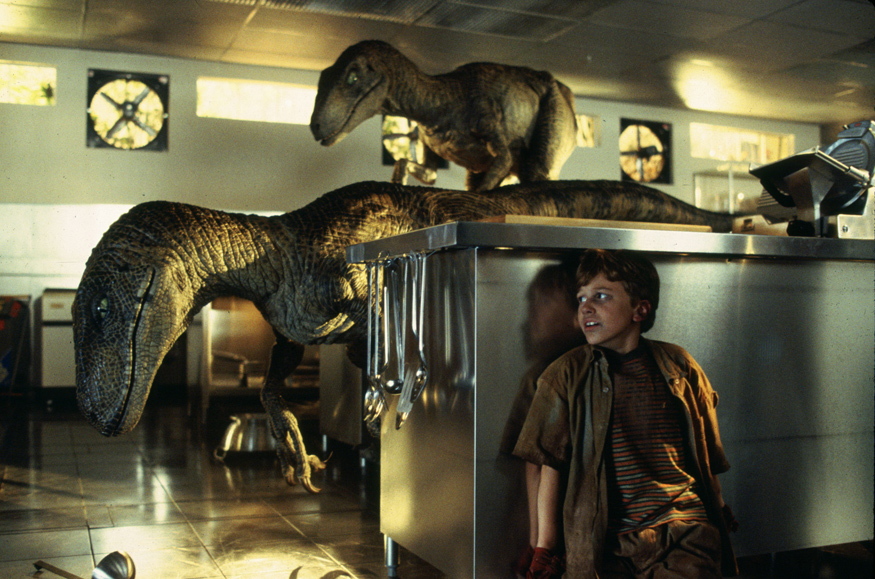
Body Count: 5
Best Kill: When lawyer Donald Gennaro abandons Tim and Lex in the Ford Explorer to go hide in the bathroom, he is rewarded for his cowardice when the T-Rex demolishes the entire building, leaving him exposed, sitting on a toilet. He is then rather aggressively chomped by the big guy.
Best Line: Ray Arnold‘s (Samuel L Jackson) catchphrase. “Hold onto your butts.”
Best Line About How Badass Raptors Are: Said in reference to the raptors testing the integrity of the park’s electrical fences.
Robert Muldoon: They remember.
Best Line Subtly Implying That Science is Evil: Dr. Ellie Sattler: I was overwhelmed by the power of this place; but I made a mistake, too. I didn’t have enough respect for that power and it’s out now.
Should There Be a Sequel: Yeah. I mean, they discovered how to bring back fucking dinosaurs. None of the scientists who cracked that DNA problem are dead. And what happened on Isla Nublar was far more of a shitty accident than evidence that bringing back dinosaurs will spell humanity’s doom. People are going to make more dinosaurs. We might as well get a movie about those dinosaurs too.
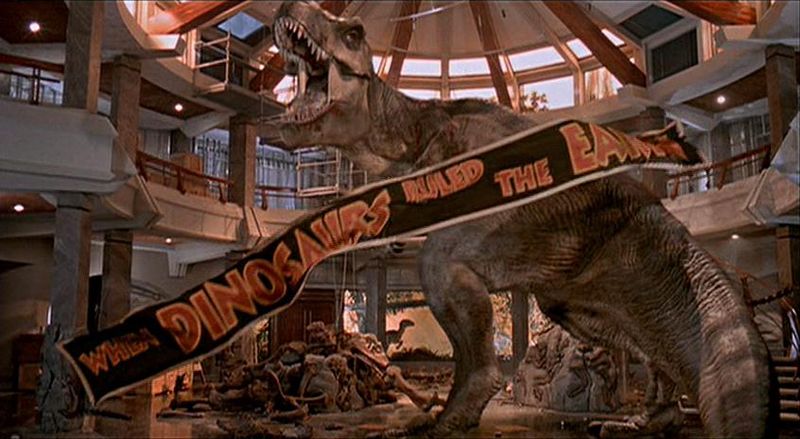
Up Next: The Lost World: Jurassic Park
DISCUSS THE FRANCHISE ON THE BOARDS
previous franchises battled
Critters
Death Wish
Hellraiser
Home Alone
Leprechaun
The Muppets
Phantasm
Planet of the Apes
Police Academy
Psycho
Rambo
Tremors